#my favourite rpg combat experience
Text
god help me so i started playing slay the spire and like, i've only tried the first 3 characters but my favourite, with 1000% certainty, absolutely no questions asked, is the defect. really not beating the robot guy allegation huh
#asto's tales#i mean im laughing but what the hell man#first WX-84 from dont starve now this#i just really love the orbs mechanic okay#having a little dude to passively do stuff for you after you're done with your whatever is like#my favourite rpg combat experience#and after the initial what the fuck is going on the orbs are a great way of making that work#i just think theyre neat!#also a lot of the defect's cards are straight up computer science humour which#a lot of it is pretty basic but idk i find it really cute#like damn buddy you sure are recursing!#hello world is one of my favourite cards for the robot
0 notes
Text
THEME: The Locked Tomb
I’m in love with The Locked Tomb Series by Tamsyn Muir, and I know I’m not the only one! For that I am extremely grateful, because there’s quite a few ttrpg designers who also love The Locked Tomb, and have designed games meant to evoke the themes or setting of the novels. Here’s a few of my favourites!


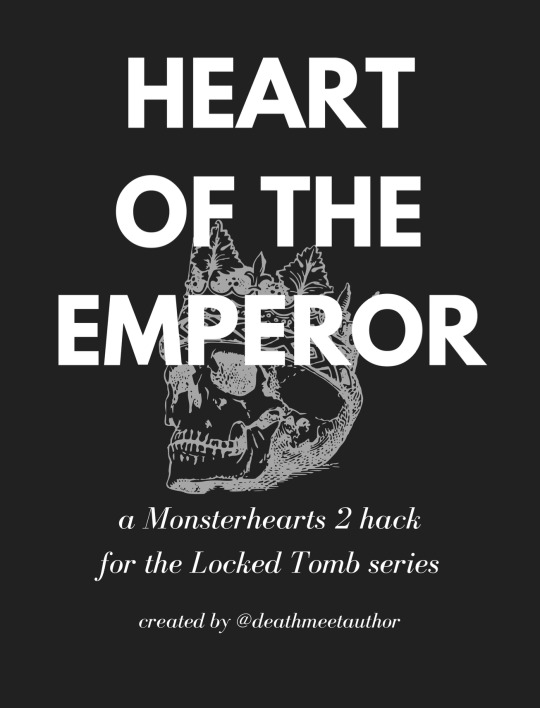

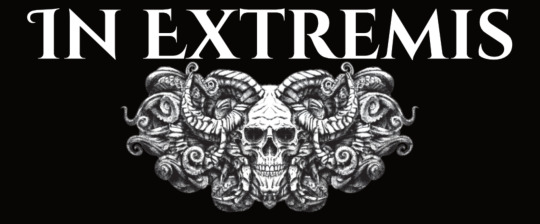
The Serpent and the Spider, by Junk Food Games.
The Serpent and The Spider is a tiny ttrpg for 2 players. One player takes the role of The Serpent, a charismatic sword-wielder. The other player takes the role of The Spider, a highly intelligent necromancer.
Your souls are bonded together. You will fight against corrupt corporations and explore your relationship.
Note that this game has references to violence, death, combat, and implied self-harm. To play the game, you need something to write with, two 4-sided dice, and two 8-sided dice.
I’ve talked about this game before as a duet game. This is probably the best game for exploring the relationship between a necromancer and their cavalier, because it’s designed to be played just between two people. It includes 9 session prompts (again, a tribute to the Nine Houses), and presents you with a setting that is inspired by The Locked Tomb while still allowing you as a pair to fill in details that will make the game work for you.
Thirsty Space Necromancers, by Understory Games.
Thirsty Space Necromancers is a Thirsty Sword Lesbians supplement based on The Locked Tomb books by Tamsyn Muir. It's Gideon the Ninth as a Powered by the Apocalypse RPG.
You play as Necromancers and Cavaliers in a space-faring culture. Paired and trained to fight together, you will solve mysteries and fight ghosts, and probably other necromancers, as you explore new planets.
This is a game that requires another game to run, but considering the tagline of Gideon the Ninth as “Lesbian Necromancers in Space”, Thirsty Sword Lesbians sounds like another great match for this kind of game. TSL focuses on love and relationships, and is also great for telling grand, epic stories. I’m interested in the additional rules to add the Dead to your game, as well as how the game plays when each player has a counterpart that they’re responsible for and/or devoted to, especially since multiple players can choose The Cavalier, while each Necromancer playbook is separate.
(Understory Games also has a collection of Locked Tomb fan rpgs, where I got most of my recommendations from!)
Heart of the Emperor, by deathmeetauthor.
Heart of the Emperor is a hack of Monsterhearts 2, centred in Tamsyn Muir's The Locked Tomb series. Rather than playing a cohort of teenagers who are secretly monsters, you may be playing a soldier of the Cohort, a teenager, or openly be a monster—perhaps even all three!
The characters of Gideon the Ninth etc. are lonely, brokenhearted, and struggle to communicate their needs and feelings, all of which are perfect for a Monsterhearts game. As with many Powered by the Apocalypse games, the focus is on how the characters relate to each-other, whether that means getting into fights, horribly misinterpreting what your crush/rival says, or uncovering deliciously horrifying secrets that will fundamentally change how you see the world. The scope of this game will be more personal than Thirsty Sword Lesbians - the future of the world isn't quite as important as your future with the the people around you.
The Empire Undying, by Glaive Guisarme Games.
You climb aboard the shuttle which is intended to convey you off this dingy planet. Embedded in the metal walls of the shuttle are bones, sun-bleached and carved with innumerable runes of protection. The only seats in the shuttle seem comfortable enough, although they have the familiar texture of human-flesh leather, tattooed over and over in a crabbed, spiky hand.
It fucking sucks. Just an abysmal experience, and the chairs make your ass hurt after like ten minutes. But if you’re going to be a necromancer there’s a whole, like, aesthetic to deal with.
Hope you like skulls, fucker.
There are two sorts of people that matter in the decrepit star empire: the necromancers who create the undead abominations upon whose skeletal backs civilization rests, and the knights whose sword duty is to defend the necromancers from undead abominations which aren't behaving right now.
In this game, you will play a group of necromancers and knights, stuck in some corner of the vast empire, attempting to solve a mystery that is, in turn, attempting to kill you all. The bad kind of "kill," the sort you don't bounce back from. Explore ancient sites and forgotten ruins, unravel conspiracies which have endured for millennia, and make out with one another, because you are hot and hurt and surrounded by bones so you have to get that tension out somehow.
Tone-wise, this game slaps. Mechanically, I like that it’s not too complex (it borrows from Lasers and Feelings) while still leaning into the number 9, which is heavily significant in The Locked Tomb. It has players explore relationships, while not necessarily expecting them to pair up - instead, you have to decide how another person’s character has power over you, which also feel so much like The Locked Tomb (think about Dulcinea’s relationship to Gideon, or the relationship between the Fifth House and the Fourth House). There’s so much to this game and it’s not even that big! If you want something that feels like it was written by Gideon herself, I’d definitely recommend checking this out.
In Extremis, by Keganexe.
In Extremis is a tabletop roleplaying game designed for 2-6 players, about fighting back the man using necromancy, that uses the LUMEN system by Spencer Campbell. Inspired by The Locked Tomb trilogy, players take on the role of exceptionally powerful witches who use their mastery of life, death, and the human condition to keep them and their own safe from other planetary invaders who want to steal their land.
As a Necromancer, you are one of a handful of hideously powerful death witches that protect the planet Hecate, the final holdout for The Coven, from the ever encroaching war of the Corvus Dominion.
In Extremis differs greatly from some of the games on this list because it focuses on combat, rather than on relationships. The game is inspired by the Locked Tomb, but doesn’t seek to replicate it. All of the players are necromancers, and all of the players are built for combat. You will go up against a terrible, powerful foe, while you yourselves are small in number, although extremely powerful. I appreciate the attempt to make this legally distinct from The Locked Tomb - there’s enough here to absolutely appeal to fans of the series, but the creator has given themselves enough license to focus on the themes of this series that appeals to theme - particularly the theme of kicking ass.
Games I’ve Recommended in the Past
Tomb Candles, by deecity. (A hack of Ten Candles)
202 notes
·
View notes
Note
Considering your caveats about MMOs, I am honourbound because of who I am to ask: what were your thoughts on The Secret World?
(It's my jank baby and I miss it every day. I know SWL is still alive but. Barely)
Secret World is very interesting for being an mmo that should not have been an rpg. is that entirely fair? maybe not. at any rate, the combat was never good and the rpg part of it as an mmorpg was always its weakest point
I'm not saying that from an elitist point of view, though. as a multiplayer experience, it was one of my favourite mmo concepts. I love the "which conspiracies are true? all of them at once, but watch out" approach it took, along with the pseudo-ARG implementation of quests. there was nothing that hit quite the same niche of "party-based detective puzzle solving" (which I think is a completely valid alternative to traditional mmo party combat, and unfortunately Secret World did not think was a valid alternative to traditional mmo party combat)
it was ahead of its time and released too early for its own good. with the modern popularity of analogue horror and horror game lore videos, it would have immediately found an audience
37 notes
·
View notes
Text
Top 10 Video Games
Thank you for the tag, @thevikingwoman! 💗
I've been thinking about this for a few days. My top 5 has been in place for a few years now, but my top 10 tends to change from year to year depending on new things I've played and how much of an impact they made or games I've revisited and rekindled a love for.
Criteria is pretty personal: games I enjoy because I find their gameplay supports their story and vice versa; games I like because it's doing something cool with the roleplay aspect; games I like purely for the gameplay; games for nostalgia or personal importance; games I think did something interesting with an interactive format to tell a story.
I'm going to exclude interactive fiction or visual novels here for a few personal reasons.
tagging @lilas @greyyourwarden @coldshrugs @galadae @a-shakespearean-in-paris @hylfystt @allaganexarch @sunshinemage @impossible-rat-babies @roguelioness if you want!
10. Heroes of Might and Magic III
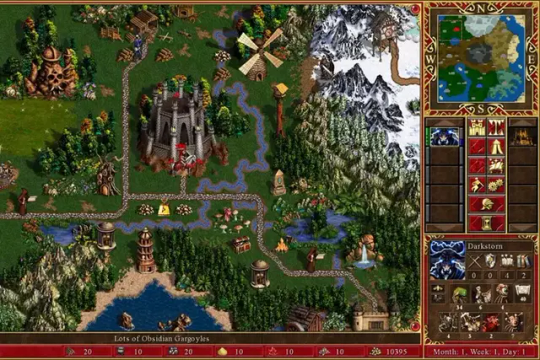
I grew up with the HoMM series. It was the first computer game I was old enough to understand; I spent hours exploring maps, building up my towns, getting freaked out when the enemy AI surprised me. Hours in the custom map maker and campaign maker trying to create playable stories. The third installment in the series has so much going for it--colourful world, really beautiful creature design, interesting and challenging campaigns that really made you think about the systems and utilize them in different ways. It's light on story, but the story that is there is interesting if you spend a couple minutes thinking about it.
This series is probably the basis of turn-based combat being my favourite type of gameplay.
The music is also really nice!
09. Persona 3
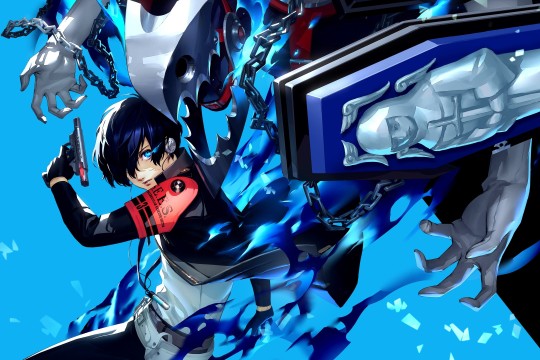
I feel like a Persona game needs to be on this list, but I wasn't sure which one. My introduction to the series was backwards: I played Persona 5 first, then P4, then P3. I think the thing that always stands out to me about Persona is how much fun the turn-based combat, combined with its sometimes bonkers monster design, the dynamics between the core cast, its in-depth storytelling, and, of course, the music.
There's something about 3's characters and story that always comes back to me. The conversation it opens about death, grief and loss is very raw but also very compassionate. I think it has one of the most thoughtful handling of existentialist and nihilistic viewpoints in gaming. It has the kind of ending that will haunt you after you witness it. You might not think about the game for years but you'll have a day where you remember Persona 3's ending and get pulled right back into thinking on it.
And Mass Destruction is here.
08. Dragon Age (Series)
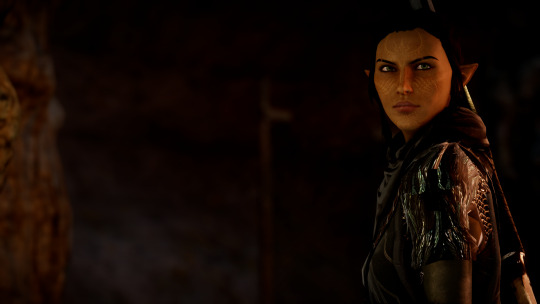
I can't choose one! I can't!
Dragon Age: Origins was the game that got me into gaming. I hadn't really played anything since HoMM as a kid. The flexibility of its UI and systems to be a kind of cross between an action RPG-style and a CRPG style made it really friendly for getting used to gameplay mechanics I was not used to. The storytelling and characters pulled me right in, and I think DA:O still is one of the best examples of interactive storytelling where the player actually has an impact on the unfolding narrative to date.
Dragon Age 2 continues to fascinate me. There are obvious issues with the gameplay, design, and overall storytelling, but the foundation of what they were trying to execute is really unique. The three-act structure is very theatrical and almost Shakespearean, using Varric as a bookend to narrate the whole experience adds another layer (what is the truth? what is fabricated for entertainment?). Act 2 has some of DA's strongest storytelling and really digs into its dark fantasy roots even as it rushes towards a conclusion that is unavoidable, grotesque, and bitterly unfair. I played this one last so I knew what I was getting into when I played it, so I was able to temper my expectations a fair amount and enjoy it for what it is, rather than what it could have been.
Dragon Age: Inquisition was the second DA game I played and it's the one I have the most hours in. The combat is a lot of fun, it has one of the most versatile CC's to date. The landscapes are beautiful and were a lot of fun to explore on the first few playthroughs. I'm still very fond of the story and the characters.
DA's transition from a more CRPG style and dark fantasy genre to an action RPG style and high fantasy genre is a shift that will probably always fascinate me and I love to talk about it.
If I had to narrow it down: it's DA:O for the overall story, DA2 for the characters, DA:I for the combat and gameplay.
I don't have much to say about the music other than Trevor Morris went off for Trespasser's Lost Elf theme.
07. Kingdoms of Amalur: Reckoning
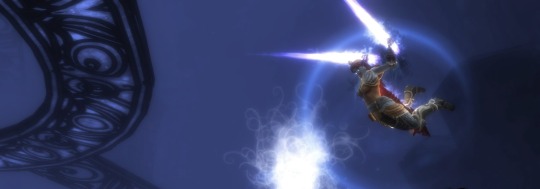
I'll be honest, I almost put Jedi: Fallen Order here because I wanted to talk about my favourite Star Wars game but it's been a hot minute since I last played it and I think Amalur has been on my favourites list for too long to kick it off.
Kingdoms of Amalur is really good and really bad and it is trashy and I love it.
If you go digging you can find its whole sordid history, but the reasons I'm very fond of it:
whacky, campy art style
colourful worlds
THE COMBAT
The combat in this game is excellent. It is freeform. You can respec at any time. There are three main classes (warrior, rogue, mage) and you can multiclass them whichever way you want. Warrior/Rogue, Mage/Rogue, Warrior/Mage, Warrior/Mage/Rogue... It's so much fun to change it up on the fly. Combat feels smooth, and once it clicks it's really easy to feel like a badass.
This game FINALLY gives mages a cool weapon. No more scepters or staffs, we're going for magic chakrams and I love it. Best weapon in the game, hands-down. Every fantasy game that has come out after 2012 that hasn't given their mage classes chakrams is missing out.
Amalur's a campy power-trip. The worldbuilding is really interesting if you want to take the time to dig into it, but you don't have to. Its MMO roots are there in much of its quest design, which is sometimes a good thing and sometimes a bad thing. YMMV with the main characters (there aren't any companions here, there are a couple of people who regularly pass in and out of your PC's life), but in general everything is just big goofy fun that shouldn't be taken too seriously.
Again, don't have much to say about the music other than Grant Kirkhope did Grant Kirkhope things. The Dalentarth theme has some nice atmospheric stuff happening.
06. Final Fantasy XV
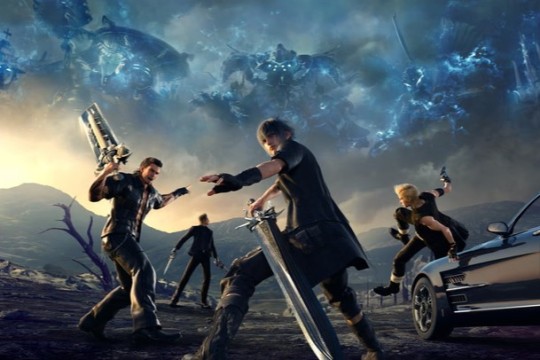
I love Final Fantasy, it's one of my favourite game series/franchises, but I'm only allowing myself one FF game to be on this list and it has to be this one.
FFXV is a weird game. Troubled development history, troubled story, troubled execution. It has a lot of good ideas packed into it that may or may not be done well, kind of confusing worldbuilding, and a kind of confusing story that asks you to do homework in advance (you can watch Kingsglaive and Brotherhood if you want to; I didn't, but I did end up having to read a few wiki articles to make sense of things). However, the final version of the game (Royal/Windows edition) has so much heart and soul and love in it. This is my comfort game, and I find myself returning to its world a lot just to drive around.
I think it helps to reconfigure FFXV from a grand sweeping epic adventure fantasy to a character study. The four boys and the bonds of their very deep friendship are at the heart of everything in this game. And if it does one thing really well, it's that it makes you feel for them and everything they go through and you're going to be a sobbing little puddle on the floor by the end of it.
The ending is sad. I love it, but it makes me cry. About halfway through you get an idea of where this is going and I'm so glad they commit to it because Noctis' story hinges on it.
The world is a lot of fun to drive or ride (chocobos chocobos chocobos) around in. You can fly, but you may get the boys killed because crashlanding it very easy to do. Pitioss Ruins is a thing that exists and it breaks my brain. The combat is a lot of fun once you get used to it (the secret is to press and hold the buttons, button mashing doesn't get you very far).
It also has one of my favourite FF villains. Ardyn is delightful. The level of spite emanating off this man is just a wonder to behold.
Oh, and the music is really, really good. This is probably my favourite FF soundtrack.
05. Nier: Automata
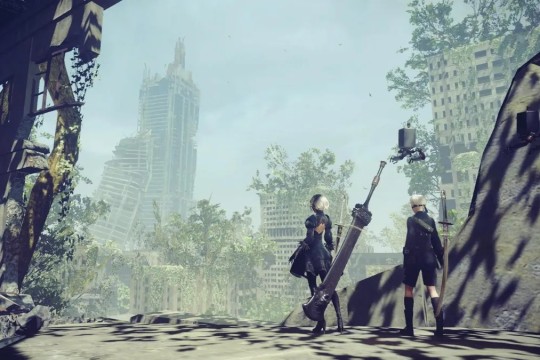
Um. Hm.
I don't know how to explain this game.
It's uh...
I don't know how to put it other than the utilization of game mechanics and UI within its story structure blew my mind. This game has an ending I still think about because I can't untangle it. Your first 15 hours is going to feel like a pretty standard scif/fantasy JRPG. Then you're going to hit what feels like the end of the story, except it's not, be asked to do something and then you're going to make faces and throw your hands in the air and ask WHY is the game asking me to do this again.
You're going to get through that next 15 hours, hit another point that feels like it should be the end of the story--
And then.
And then.
I don't know how to say that the silly android vs robots game where you can blow 2B up to see her butt (yes that's a thing, ignore it) is one of the weirdest but most compelling gameplay experiences I have ever had. It's weird. But it works. But it's weird. But it works.
Also the gameplay is really fun but it's sheer chaos because it changes what it wants to do every 5 minutes because it gets bored. You go from bullet hell shooter to hack-n-slash action with combos, to hacking into a robot and running around in a pixel world dodging balls.
The balls are endless.
The balls are everywhere.
We become as gods balls.
Have I mentioned that the music is really good.
04. The Legend of Zelda: Breath of the Wild
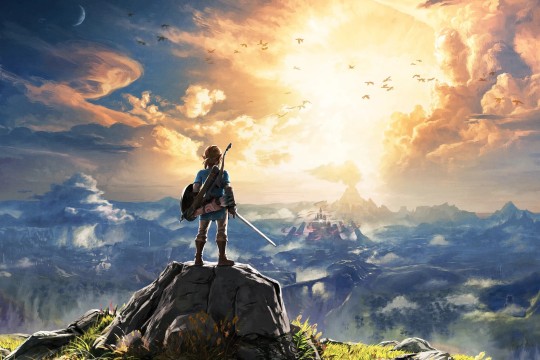
This is another comfort game. There's something about BOTW's world that is just so relaxing. I love exploring every nook and cranny, cresting the hill to see what's on the other side. I am content to ignore the main quest just to see if I can scale a mountain in the rain (no) or terrorizing an enemy camp by launching a burning tree trunk into the middle of their campfire.
I feel like all the systems work together cohesively, building off each other in a way that lets the player flex their imagination, test things, and see what happens.
I remember the score getting some flak because it didn't have the bombastic and catchy themes that previous Zelda games have, but the scaled back and atmospheric tone really works for the game. BOTW is a gently horrifying post-apocalyptic world. The moments when you do need strong themes, the score delivers in spades.
03. Horizon: Zero Dawn
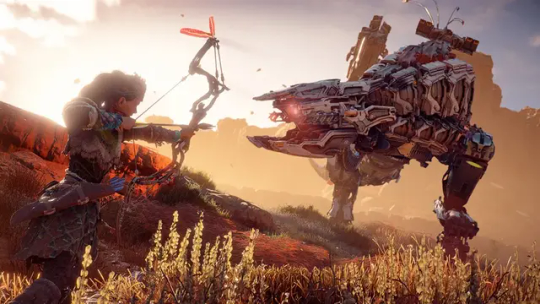
I love this game so much.
Aloy is such a joy to play as. Her characterization is set in stone, but when you do have diverging dialogue options, everything feels like something she would say so it's really easy to roleplay her. She does talk a fair amount as she roams around the world, but Ashly Burch's voice acting is really lovely to listen to.
HZD has one of my favourite post-apocalyptic worlds. The worldbuilding is in-depth, the developers have thought everything through in how these societies came to be and now function. The combat system is so much fun; early techniques provide a foundation for later ones, and you have options in how you want to tackle various enemies or problems. There's a lot of flexibility in how to go about things, so one person's playstyle may be completely different for someone else.
The animations and sound designs for Aloy's assorted bows are so satisfying.
This is another game where I love wandering around the world so much I usually forgo fast travel because I love the journey, even if it takes me longer.
Not much to say about the music other than the themes for Meridian are very nice.
02. Hades
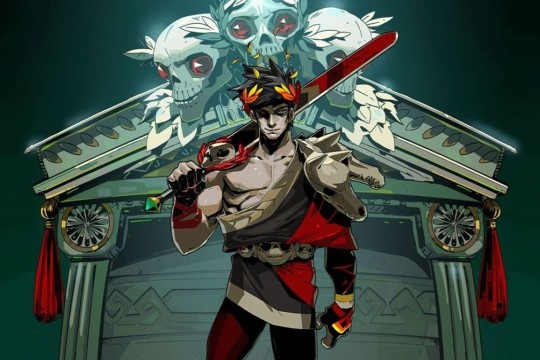
Hades is probably the most polished game I have ever played. It is virtually bug-free. The gameplay compliments the story and the story compliments the gameplay in such a way that you cannot separate them. It feels like every choice behind this game's design was done with purpose and precision.
The art style is gorgeous. The music is off the charts - sometimes you can't tell what came first, the level design or the music, they're so in-sync with each other.
The characters are delightful. Everyone has understandable motivations and desires; everyone is ridiculously likeable, particularly Zagreus himself.
It's so easy to fall into the pattern of "just one more run" because you want to stay in this world a little longer, you want to push yourself further, you want to challenge yourself again. And even when you don't complete a run, losing or messing up doesn't feel like a punishment because you have all your favourite characters waiting for you back at home with another opportunity to talk to them.
01. Fire Emblem: Three Houses
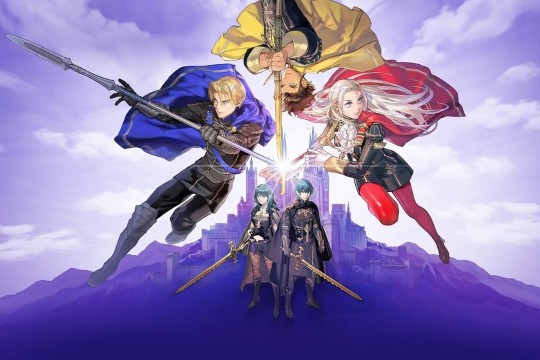
I don't know where to start because I love this game so much. Turn-based combat with an in-depth levelling system and a diverging storyline so there are actually FOUR separate stories in one? Catnip to me.
The combat system is exactly the kind of turn-based combat that I can get addicted to; I love the risk/reward, the chance of failure, yelling at the AI for getting the better of me because I put a unit in a risky spot and now they're permanently dead and I can't rewind time.
Each of the stories can stand on their own and give really different perspectives on unfolding events. How you view one character on one route will be completely different when you see them on their own and get a chance to get to know them.
The cast of characters is very large, but everyone has their place and everyone has their own journey and arc to go on. The character interactions are delightful. Because of the house and recruitment system, it is really interesting to see characters you recruited out of their houses and into yours and how they change when the story diverges and puts them down a different path--especially if that path puts them in direct conflict with a former friend.
The English dub for this game is out of this world, it is one of the best ENG dubs I've heard in years. The music has some absolute bangers for combat music, especially in the endgame. Shout out to my favourite, Chasing Daybreak and also Funeral of Flowers because it's underrated.
17 notes
·
View notes
Text
Skies of Arcadia Legends
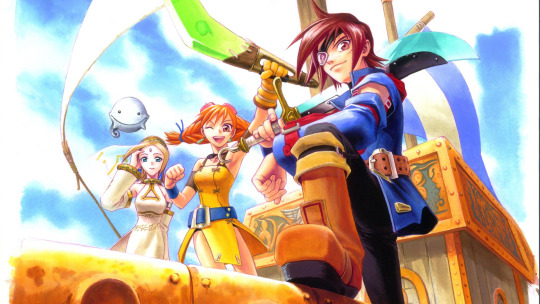
At the risk of seeming like someone who starts reviews with their life story, I vehemently disliked Dreamcast back in the day. I won't go into why, but an older me has still to play catchup with some of the more notable games I missed due to this. Skies of Arcadia being probably top of that list until I beat it last night.
Produced by the late Rieko Kodama of Phantasy Star IV notoriety, I'd always kinda had half an eye on this game. Until Persona 5, PSIV was probably my favourite RPG ever. So, here we are with not-Phantasy Star, set on the world of Arcadia. Which is all apparently in the sky and has six moons? Is Arcadia a gas giant planet? Just, like, a really small one? It doesn't matter, as an excuse for motherfucking sky pirates I'm totally here for it.
The story pans out, in the broad strokes at least, quite typically. Of an evil empire, an ancient race, and a world-threatening danger the former needs the latter to bring about. But it's the finer strokes that shine; I was quite impressed with a fair smattering of the scenes here, even containing some half-decent 'acting' from the polygon models and their replacement-texture faces. It never went anywhere radically new, but what was there was good enough that it didn't have to.
Combat is pretty solid as well. This game's thing being that, well, all your spells take 1MP to cast. However, there's a 'spirit point' cost to them (and special/super moves which take zero MP) -- which come from a pool shared by the entire party. This adds a resource-management element to it all, and changes up the dynamic from the usual oldschool RPG turn-based combat affair of "hit the boss with all the heavy stuff, heal if need be". You may have to pick one or the other. Or both, if you spent a turn or two using the 'focus' ability to forego any action in favour of generating more spirit points than are normally awarded per turn.
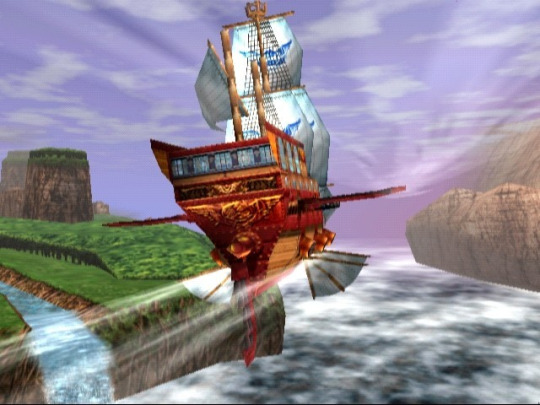
There's also, this being sky pirates and all, airship combat! Also turn-based, this replaces the four character actions with four discrete slots per turn with which to do whatever; a selection of four onship weapons, items, or later on there's even a selection of spells from your character's arsenal (although selectively so). These are grand in scope and quite dramatic; but also a little long-winded.
In fact, that's related to perhaps my singular complaint about the whole journey; quite often there's a lot of game between save-points. My RPG playtime is late at night before bed (the experience as a whole of the genre is somewhat sleep-inducing for my attention span and I) and "I'll play until the next save" kept me up longer and longer as the game progressed. Not a problem for binge-gamers, and only a small niggle for me.
I have some reservations about the game's look as well, but that's a product of it being still relatively-early 3D territory and the jank that comes with it. But the art direction is pretty good, and has an excellent soundtrack to boot -- I hear the Dreamcast original sounds even better.
I'll stop beating around the bush now, Skies of Arcadia Legends was an amazing time in its 40-hour runtime. I'm definitely going to play through it again at some point in the future.
5/5
#skies of arcadia#skies of arcadia legends#gamecube#dreamcast#sega#overworks#rieko kodama#rpg#jrpg#sky pirates
9 notes
·
View notes
Note
What would you recommend to someone thinking about starting with swtor in this day and age?
Huh that's actually a really good question, and it probably doesn't help that I've not been active for the last two years (they made some fairly substantial gameplay changes to the combat that I didn't like the sound of on paper, I have no personal experience with how it's played out and whether folks think it worked out well in the long term)
I'll put this under a cut to spare people's dashes, and if any friends have their own recommendations based on current gameplay and gearing PLEASE feel free to chip in:
The game has free to play options, and in theory it's entirely possible to play up to the fourth (fifth?) expansion without paying a cent. I don't necessarily think it's particularly as fun as it could be on F2P, because obviously they make things just that little bit more frustrating to try and coax you into spending money, but it's not bad. Just a little slower to progress. And really, if you're not sure if you want to invest in the game (time or money wise), downloading the F2P is a good trial move, because the base game is hands down superior to most of the expansions
There are 8 possible origin stories to choose from - four Republic aligned, and four Imperial aligned. Despite stylistically being the same 4 classes, the story telling has always been the strength of the game and the 8 original classes are all fantastic in their own ways. Admittedly, ask 8 people what they think the best or worse class story is and you'll get 8 different answers. I personally rank the Smuggler (a Han Solo-esqye self insert) as my least favourite, but I've got plenty of friends who think it's the best story. I would die for my Jedi Knight but I think the writing from the story is pretty outrageously bad in places. The Sith Warrior class story changed my life. So did the Imperial Agent, but again, I know people who think they're overrated. Just go with your heart and see what appeals to you when it introduces the class options
There are nine packs that I would consider expansions (more if you include mini gameplay expacs that introduced things like starfighter combat, they always have little brief story quests to explain their origin):
Rise of the Hutt Cartel (adds planet Makeb)
The Dread War (adds planet Oricon, technically a continuation of RotHC but different enough in scope that I would count it as separate)
Shadow of Revan (adds two planets, Rishi and Yavin 4)
Rise of the Emperor (adds planet Ziost, technically a continuation of SoR like TDW was for RotHC)
Knights of the Fallen Empire
Knights of the Eternal Throne
Fractured Alliances (technically a continuation of the last two, but adds Iokath as a playable area)
Onslaught (adds three planets Ossus, Onderon, Mek'Sha)
Legacy of the Sith (have not played so not sure!)
KotFE and KotET moved away from planetary expansions and did chaptered missions, so you couldn't visit the areas of the story unless you replayed the chapter, which was a pain if you enjoyed just running around exploring. Technically we got new planets Zakuul, Odessen and Iokath in those expansions, and Iokath did eventually introduce daily missions and explorable areas, but it wasn't the most popular addition to the canon
I personally enjoy KotFE and KotET because of the amount of time I invested in telling my character's stories in that time period, but I think that Shadow of Revan/Rise of the Emperor had the more compelling storytelling and gameplay. Rishi is for sure my favourite planet in the game, although Onderon comes close and I'm sure Zakuul would've won if we got more ability to just run around and explore
Basic gameplay is pretty straight forward if you've ever played an RPG or MMO before. It's entirely possible to play the vanilla stories without ever needing to play any group content, and you can just treat it like a solo player game with some extra fidgety NPCs in the background of your scenes and pretend they aren't other players. The group content - flashpoints (4 players) and operations (8 or 16 players)- are for the most part pretty great, and a lot of their stories bring more clarity to the main game. As the game gets into the expansions, they start introducing solo player flashpoints which then become the chaptered mission when you get to KotFE.
You also get access to companions right from your first planet, which is great! Every class starts with 5 companions, and that number grows as you get into the expansions. Some of the companions can be romanced, although unfortunately everyone was straight-gated up until Shadow of Revan. After that, earlier companions have occasionally been rewritten to be available to all genders, but not all of them which is frustrating at times. The relationships you build with the companions - whether it's romance or friendship or intense loathing - is genuinely such a great feature of the game, and it's something the later expansions have suffered from, not having your core team around you anymore.
SPEAKING OF, I WILL WARN YOU UP FRONT, SHAE IS NOT A ROMANCE OPTION :P I just don't happen to believe in being restricted to canon when it comes to these sorts of things. She's an NPC, and you can flirt with her now and then in the later expacs, but she's not smoochable.
I can't comment on the current combat system, or the current gearing system, as I've been out of active play for the last few years (ESO got me good) but I hear they've worked out some of the kinks from the revamp. I wasn't overly thrilled with it, as I've played fairly consistently since launch and this was going to be about the fifth complete overhaul of the combat and gearing since launch and after going to the trouble of getting all your characters the best gear multiple times only to be told you have to start from scratch AGAIN wears a little thin after awhile. But! If you're not planning on hardcore raiding, gearing changes shouldn't be that much of an issue
The housing system is fun but there's no real way to decorate well without pumping a lot of your own money into the game which is shitty. I've seen the light in ESO's crafting and being able to craft my own furniture is game-changing
Space combat is a nightmare. My spatial awareness becomes non-existent once I have to steer in a three dimensional space. I have one friend who loves it and used to play constantly but I couldn't ever get used to it
PVP is eh. I've had more fun in PVP in other games, but it's not bad.
The crafting system is fun, but unless you're making your own healing packs or dyes, its not really worth much. Sending your companions off on crafting missions can be fun though, as they come with teensy little snippets of lore and some of them are funny or intriguing. It can get expensive real fast though
The only thing I would caution against is that they've made some fairly unpopular changes just in the last month regarding the cost of quick travel to try and rein in the bloated in-game economy and it seems to have been implemented poorly and unfairly effects low to mid tier players as opposed to the high end players
If you have any questions after all of that, let me know! AND GOOD LUCK!!!
12 notes
·
View notes
Text
Remembering what was Lost: My Dragalia Lost Experience

My time with Dragalia Lost wasn't as long as I wished it could be. I knew about the game since its launch, but my low quality phone at the time made it almost impossible to play. It felt like a tragedy since the concept of forging bonds with dragons pulled me in like everyone else. It wasn't until the fall of last year I played the game consistently after upgrading my phone. For a while, it seemed like I found my daily routine. I'd login every day for daily challenges, linger on the main menu to hear my units chat it up, fall in love with adventurer stories, and bob my head to epic boss music. All was going well until news of the end of service struck the community.
To say we were all shocked is a huge understatement. An important part of our lives was about to join the graveyard of forever lost video games. With news of Dl's impending doom, I was forced to reflect on my experience with the title and came to a surprising conclusion: Dragalia Lost is easily one of my favourite games of all time.
I don't usually talk about video games on this blog, but Dragalia Lost holds a special place in my heart for being the most fun I've had with a mobile game. It hit all of that boxes that other gacha games struggle to keep up with.
It's impossible to talk about DL Without mentioning Daoko. Whether players are chilling on the home screen, slaying a deadly boss or summoning beloved units, Daoko's pop vocals are bound to be heard. Even some of the instrumental tracks are remixes of her other songs. Her songs fit the game perfectly as they invoke the feeling of a light-hearted and fun-filled adventure. The pop score helps DL stand out from other games which usually use European orchestral music. It gives the game an oddly fitting contemporary atmosphere. Ryusei Toshi and CRASHER remain iconic tunes that gets players into the thrill of a good ol' boss battle.
While on the topic of the sound department, the English voice acting deserves special mention. Ocean Productions was in charge of the voices and that makes DL an incredibly rare case of a Canadian dubbed anime game. Each voice was a breath of fresh air that fit the characters like a glove. Special mention goes to Brian Drummond as Zhu Baije, Tabitha St Germain as Althemia, Richard Ian cox as Ranzal, and Mark Oliver as Hawk.
My only complaint is that the English audio lacks fully voiced dialogue. That could've gone a long way to making the game more immersive.
Pokemon TCG artist Naoki Saito brought his A game with the art design. Most of the characters have highly rememberable designs done in a vibrant pop art style. Character portraits were always a delight to look at due to how much they popped out on the screen. Each adventurer has a unique appearance highly distinct from each other and full of personality. The fun expressive style really added to the Saturday morning cartoon feel of the game. The user interface also has a nice sleek look to it that made navigating menus anything but a chore. While the chibi graphics can seem overly minimalistic at first, that simplicity prevents the game from feeling dated and instead gave it everlasting appeal.
It may seem disingenuous to review a game without mentioning gameplay but there's not much I can say in that department. DL's isometric action RPG style made it stand out from other games on the market even with its very limited attack system. It wasn't the most immersive combat system I've experienced, but it always kept me back for more and never left me bored.
The implementation of skip tickets and auto-loop was a godsend for grinding and made it overall stress-free. I didn't have to waste hours of time just to upgrade a single character. Just hit the auto button and step away from the phone for a while. Seriously, more games need to follow this method instead of making maxing out units so tiresome. The Co-op raid battles also deserve special mention since it was so fun seeing strangers come together to beat a particularly arduous boss. There were several times I relied on Co-op to clear stages because the difficulty is no joke at times. This was especially true for the MARVELOUS final boss Xenos which can easily last half an hour. Now that's how you go out with a bang.

Last but certainly not least is the story. It starts off simple enough with Euden performing his princely duty of forming a dragonpact; the main draw of the game. Then the game added layers of complexity with Zethia's dark doppelganger and the King's sudden evil disposition. The carefree prince now has to save his kingdom from his treacherous family with an even greater threat looming in the background. The beginning of rbe story was a bit slow at first, but there were enough plot twists and burning questions to keep me fully invested. I so was not prepared for the time travel shenanigans and social commentary on classism/privilege the mid-game story brought.
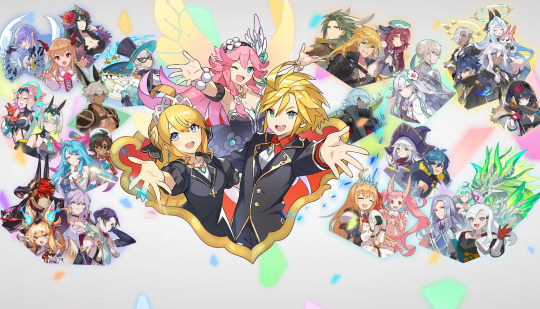
And that's only what the main campaign brings to the table. Dragalia has several event stories that heavily build on the robust lore and characterization players love so much. Certain events like Faith Forsaken, Fractured Futures and Advent of the Origin even serve as epilogues to plot points made in the main story. I will admit that there were FAR too many beach themed events for my liking. This game had great slice-of-life moments but it'll be too soon if I ever see another beach adventure in a mobile game.
Finally, it would be irremissible of me not to mention the vocabularian localization provided by 8-4. Character dialogue is stuffed to the gills with personality and colloquialisms you wouldn't expect from this game at first glance. It's guaranteed you learned a few new vocab words after playing the game. Seriously, some of these characters talk like they eat thesaurus' for breakfast. That's when they're too busy spouting meme worthy dialogue at least.
Dragalia may be lost, but I'll never forget the incredible memories I made along the way.

#dragalia lost#cygames#nintendo#mobile games#Jrpg#daoko#naoki saito#Review#Game review#retrospective#Video games#Anime game
16 notes
·
View notes
Text
My Thoughts On: CrossCode
As Steam’s 2023 Summer Sale rolled around, I was itching to grab at least one game before the sale came to a close. I had heard of CrossCode from a YouTube video a while ago and kept it in the back of my mind until a sale rolled around. After weighing up any other potential games I’d like to grab instead, I settled on CrossCode. Lo and behold, I was beyond pleasantly surprised with my experience and enjoyed it more than I imagined I would. I wouldn’t hesitate to call it one of my favourite games I’ve played this year, which says a lot considering I had just spent an ungodly amount of hours in Tears of the Kingdom just a couple of months ago.

Crosscode is an Action RPG developed by Radical Fish Games. Originally a hobby project, CrossCode was successfully funded on IndieGogo and fully released in 2018, following a 3-year tenure in early access. In 2021, the game would receive a paid DLC, adding a significant amount of post-game content. This lengthy development time has resulted in an extremely polished product that has clearly had so much love, dedication and care put into it. I’ve tried to keep this little write-up extremely light on spoilers in case a wandering soul finds their way here and decides to play the game themselves.
CrossCode is set in a sort of faux-MMO. Games about games aren’t rare nowadays but CrossCode’s take is well executed. The setting can be difficult to explain in summary, and is easier to get the jist of when playing the game yourself, but I’ll try my hand. CrossCode takes place in CrossWorlds, an MMO that exists in the far future. Instead of traditional MMOs as we understand them, CrossWorlds is not in fact virtual. CrossWorlds itself takes place on a terraformed moon and players don headgear, much like virtual reality headsets that we know today, allowing them to control their characters, called avatars. A great deal of effort was put into maintaining the illusion of a highly populated MMO world. The protagonist, Lea, is a player logged into this game herself. Your party members are in-universe players and behave as such. You’ll see other players running about the world and chatting about the game and the experiences they’ve had within it. This MMO-based world allows the game to toy around with genre convention, engage in meta humour, subvert player expectations and tell a story that is entirely unique to the setting.
CrossCode’s visuals are a clear homage to the art found in SNES classics. Player and party sprites are cute and charming, but appropriately readable. Effects for powerful abilities are striking and flashy, while sprites for large and dangerous boss monsters ooze with menacing detail. Spritework for the game’s numerous locales is delightfully vibrant, a particular favourite of mine being Sapphire Ridge. Pictured below is Autumn’s Rise, the game’s first major area.

I heavily enjoyed CrossCode’s soundtrack, composed by Deniz Akbulut. Battle themes are upbeat and electric, matching the pace and energy of the game’s combat. Dungeon themes on the opposite end, are moody, thought-provoking tracks, acting as appropriate backdrops to the game’s unrelenting puzzles. Tense story beats have appropriate tracks that set the mood wonderfully. Particular favourites of mine are Autumn’s Rise and Lea!. Autumn’s Rise is the track for the game’s introductory area of the same name. It is welcoming and upbeat, with a palpable air of discovery and excitement, serving as the perfect introduction to CrossCode’s journey. Lea!, as its name implies, is the protagonist's main theme. A calming and pleasant track that finds its motif used in several other places in the game’s OST. Keep a keen ear out!
CrossCode’s moment-to-moment gameplay is extremely polished, with Lea being incredibly responsive and easy to control. Lea's base arsenal consists of a chargeable, bouncing projectile and a melee combo, as well as a dodge and guard. The depth of this combat system can be found in the game’s skill tree and element system. Its skill tree allows players to upgrade certain attributes and unlock stronger forms of Lea’s four base abilities named combat arts. These combat arts make use of an ‘SP’ meter, with stronger arts requiring more SP to use. SP slowly restores on its own, but does so even faster when dealing damage to enemies. This motivates the player to stay active in combat, always building up SP in order to continually throw out powerful offensive or defensive abilities. Elemental modes allow Lea to swap between a number of elements on the fly, altering her current stats and damage type. Each element offers an entirely new set of combat arts, resulting in a large amount of options at Lea’s disposal at any moment during a fight. This also makes unlocking each of the game’s elements exciting, as each element introduces further variety in both combat and puzzle solving. Combat itself is fast and frenetic, requiring quick thinking and understanding of both enemy attacks and weaknesses to come out on top. Enemy encounters specifically were a highlight, with each enemy type having unique behaviours and their own individual strategies in order to take them down. This ranges from attacking them during an indicated phase of vulnerability, attacking a specific part of their body or building up a stagger meter by attacking with an element the enemy is weak to (and many more!). CrossCode also offers numerous pieces of equipment that offer certain modifiers to Lea’s skillset that allows the player to further specialise and build to their tastes. However, seeking out specific pieces of gear can require some extended material grinding. I generally ignored extensive trading and only picked up gear that I already had the materials for regardless, but after finishing the main story and picking out select pieces of gear I wanted to craft in order to tackle some post-game content, I did have to spend some time running around to grind out the necessary materials.
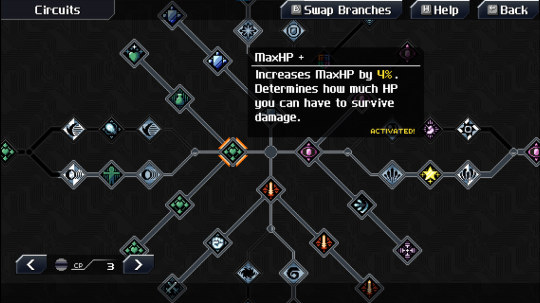
CrossCode's dungeons wear the game’s 2D Zelda inspiration on its sleeve, with large, labyrinthine structures, featuring puzzles, enemies, locked doors and a final 'boss' key the player must collect to face the temple's last challenge. CrossCode does a phenomenal job at introducing a temple's major mechanics and continuously building on them as the temple progresses. What goes from a single, simple interaction will eventually become an entire web of puzzle elements that weave together to create a challenging, but satisfying experience. Many puzzles will require tight and consistent execution beyond figuring out the solution. A temple's primary puzzle mechanics will also be used in enemy rooms, as well as the temple's boss, wrapping the experience up with a nice little bow. The amount of unique and varied interactions present in CrossCode’s dungeons is staggering, especially considering that Lea’s primary method of solving puzzles is solely through the use of her bouncing, ranged projectile. Admittedly, while I feel CrossCode's temples are very well executed in terms of their design, I did find myself fatigued at times. Dungeons are long and involved, and the ever-increasing complexity of a dungeon's puzzles often left me tired. Although I may be partly to blame since I was playing such large bursts, I’d probably feel different had I taken the game slower! Still, I never felt the puzzles themselves to be poorly designed. CrossCode has a certain ‘language’ to its puzzle design that made it easy for me to get the idea of what a room was asking of me. This didn’t mean I solved each puzzle with any semblance of swiftness, but upon entering a room and getting past the initial shock of, “Wow that’s a lot of things”, scanning the room and the puzzle elements it contains made my brain begin churning with various ideas. Following this, I enjoyed experimenting with what was available in a room, slowly putting together what the puzzle’s final solution may be. This concludes with solving the puzzle itself, which as mentioned previously, is an execution test, requiring me to put my potential solution to work with well-timed and precisely-aimed projectiles. I fell into this engaging loop of ‘scan’, ‘experiment’ and then ‘solve’, feeling very satisfied after each room I cleared. Besides the puzzles themselves, the developers included visual aids like floor markings to be a subtle guiding hand for a player. I’ve only done a single playthrough, but I look forward to running the dungeons once more with the experience I’ve now garnered. Related to puzzles, CrossCode offers accessibility options that allow the player to tune puzzle speed to their liking. While I never found myself making use of this feature, it is appreciated for players that have difficulty with or aren’t interested in its puzzle gameplay.
The rest of CrossCode’s gameplay is found in exploring its vast locales. Areas consist of many rooms filled to the brim with enemies and collectibles. Players can blast away flora for materials and hop across terrain. The game offers many chests which contain valuables outside the player's reach that require platforming across an area’s geography to reach higher up ledges. Also littered across these areas are numerous mini-puzzles. While not as substantial as their dungeon counterparts, they offer a distraction from combat and platforming, often leading the way to chests and opening up shortcuts to make navigation simpler. One of my few qualms with CrossCode is found here. The game’s isometric perspective means judging heights and distance for jumps can be unintuitive. By the latter half, I found myself ignoring some of the more deviously placed chests because I just didn’t have the patience to seek out one specific ledge I needed to climb up and then fall off three times on the way to the chest by misjudging my jumps.
Much like any RPG, CrossCode features a bevy of sidequests alongside its main content. RPGs regularly fall subject to menial and tedious sidequests and I was happy to find that CrossCode’s were generally enjoyable. This isn’t to say the game is free from the usual affair of “Bring me 7 yum-yum apples”, but several sidequests offer entirely unique content and interesting spins on existing mechanics, especially further into the game. They’re still rather inconsequential in the grand scheme of things, but I found them worth playing through for the extra dialogue involving Lea and her current party, on top of the extra bits of gameplay they provide.
CrossCode's protagonist, Lea, is subject to much praise. Silent protagonists are not at all uncommon in games, especially RPGs, characterised by, of course, their silence. Usually, the intent is for the silent protagonist to act as a sort of vessel for the player to interact with the game and make what they will of their experience with its world and characters. This does not mean silent protagonists are entirely devoid of character, there'll usually be some tidbits of information and personality that the player can come to learn. For the most part, though, the silent protagonist’s fellow party members will usually do the heavy-lifting in terms of dialogue. CrossCode's Lea approaches the trope differently in that her silence is an important aspect of her character and underpins many of the interactions she has with those around her. Upon awakening, Lea learns that she is incapable of speaking due to her avatar's speech control module malfunctioning. Exceptions lie in a few ‘hard-coded’ words she has available to her, like the simple and iconic, “Hi!”. While she may not have much in the way of words, she is extremely expressive, owing to the game’s numerous, vibrant portrait sprites, each beaming with personality and charm. The game is rather dialogue heavy, and Lea will be meeting and starting up conversation with many characters on her journey. She is incredibly reactive and will regularly make her thoughts known through body language and expression. For example, exasperation when tasked to do something trivial, joy when greeting a friend and a palpable smugness when she succeeds. She is motivated, friendly and competitive, with a slight ego and an occasional knack for tomfoolery. Furthermore, Lea’s limited vocabulary results in her needing to be creative in the way she uses the words she has available to her. As a whole, Lea is a phenomenal protagonist that makes CrossCode all the more memorable and compelling.
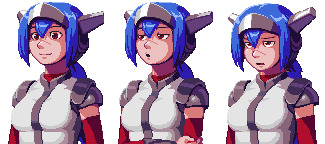
As for the game’s other characters, CrossCode is an a unique position in that your traditional RPG party members are other players within CrossCode’s MMO setting. This results in party interaction that is intended to mimic that of banter between friends during an online play session. While travelling around the game world, party members will comment on the design of an area you’ve found yourselves in, the absurdity of the enemies you’re fighting and much more. To further cement the online party experience, party members, of course, lead real lives outside of the game and will mention goings-on in their days. Some may even need to log-out of the game after a long play session, leaving Lea to her own devices. Much like Lea, there are an abundance of portrait sprites for each party member, with an equivalent amount of care and detail put into each. In combat, party members are AI controlled, running about and fighting enemies independently. This lack of control and the way in which the AI for party members functions holds up the illusion of party members being players themselves. I enjoyed that as Lea’s skillset grows ever-larger, her party members will follow suit, choosing upgrades for themselves and purchasing their own new equipment. The party system and the way characters interact during exploration are effective in evoking that feeling of forging connections through online gaming and running through vast virtual words with newfound friends.

I’d prefer to keep thoughts on the game’s narrative to a minimum but as mentioned earlier. It is rather slow to start, but uses this time to get the player accustomed to its unorthodox setting and allow time for Lea to come into her own and forge bonds with others. I found myself eager and excited for major story beats, which the game certainly delivers. There is a particularly stellar extended story sequence that has still stuck with me weeks after completing the game. I did find the game to have some pacing issues, more particularly in a section with minimal story content and three large dungeons back-to-back. The player is able to complete side-quests and the like between these dungeons, but it is a rather long stretch and I did find myself yearning for a more substantial reprieve from the barrage of puzzles. However, this section of the game followed rather heavy and extensive story content so it is effective in allowing the player, and Lea, to decompress.
I would recommend CrossCode to anyone that enjoys smooth, fast-paced top-down combat and tough, execution-based puzzles on top of an intriguing narrative with fun characters and exciting story beats. It saddens me that it has fallen off the wayside in the wider indie gaming sphere. I feel it truly does deserve to be heralded in the same light as its more well-known indie contemporaries. CrossCode is a phenomenal first outing for Radical Fish Games and I’m looking forward to their next title, currently in development under the name of Project Terra.
5 notes
·
View notes
Text
Games Mero Played, 2022 edition
Yeah the year’s ending, and among other things I’ve been wanting to practice my writing skills in general so here’s short review type things about most of the games I played this year, big and small (as long as I remember them). Not that anyone’ll read this but yeah. Might do one for books too later.
So, in no particular order:
Xenoblade 3 - This one was fun. For those who don’t know me, I’d say that Xenoblade is probably on my Top 2 favourite game series (the other being Zero Escape DO NOT GET ME STARTED ON ZERO ESCAPE), so I was, obviously, extremely excited for this one, so much so I timed my work vacation to play this game. And boy did I need those 3 weeks off, this game, as most jrpgs, took like 200h to complete, enjoyable all the way. Really the only problem to be said abt it is that the real climax of the story happens like 4/5ths into the game? And the rest feels a bit like they ran out of steam or money or time, or all of the above. A greatly dissappointing final stretch, bland final dungeon and tedious final boss kinda sour the game’s conclusion, but otherwise this really was THE rpg of the year.
Splatoon 3 - I’m don’t think I’m that big a fan of splatoon? Like, the gameplay is very fun indeed, but I guess multiplayer games in general will tire me out quickly as I get very salty very fast when I don’t win. But that aside Splatoon 3 is great! Very fun! Cute squid-octopus-kids abound! A fun single player mode that feels complete! Whenever some of my friends want to play something together I think this will be our go to game. I just wish this ONLINE MULTIPLAYER GAME’s online wasn’t such utter garba- Connection Error, you have been disconnected
Bayonetta 3 - Oof. Thats all I can really say abt this game, unfortunately. Well, clearly not, as there’re more a big paragraph here, but ‘oof’ does capture my feelings in all. I was so so so excited for this game. I loved the previous two games (though Im faaaar from a actual avid player of them, pure platinum is just not something I have patience for, and I didn’t even beat any of the superbosses throughout the series), and I love Bayo very very much. The VA drama happenned, and yes it did dampen my hype a decent amount, but I was still excited to play the game which I did and..... yeah. This game’s just not as fun as the previous games, by far. There’s no fun Bayo backtalk, this time she just lets the villain monologue. There are a few fun, campy setpieces as usual, but they’re surrounded by such a dour atmosphere! One of them does come close to making the game as fun as the previous ones though, the Ba’al Zebul fight specifically (this here was THE DIVA MOMENT I wanted. But Bayo herself barely reacted or interacted with her, she just looked silently on after the fight, as she did most of the game). But then the ending happenned and it lands with as much grace as shit hits the toilet (mind you, I don’t really care about the straight thing? Sure it comes out of nowhere but it’s as plausible as anything at that point. What really bothered me was the FOUR ‘Oh we won! oh wait no’ sequences that happenned. In succession. With no payoff). And then there’s the combat, which, yeah, is much closer to the engaging fun of the previous titles’ than the story, but somehow it still didn’t click with me, though yeah keep in mind here I’m not a hardcore player of action games. It’s just... disappointing. I don’t think I’m playing the next games in the series, at least not at launch. I’ll want confirmation that the tone is back where I like it first, at least. Even though it came out years ago, I think Astral Chain takes the cake between these two.
Pokemon Legends Arceus - I didn’t expect much from this game, but in the end it was a fun, refreshing experience. I had a blast exploring Sinnoh through this past lens, even though the edges were very..... polygonal, and the gameplay and focus on just catching oodles of pokemon was like a breath of fresh air. Sure the plot was as simple as I expected, but there were enough twists there to tide me over, and the soundtrack sure helped. I did not play sword and shield, and really only played this cause I love Sinnoh so much (and cause a friend lent it to me), and it was my enjoyment of this game which led me to tentatively buy...
Pokemon Violet - I bring nothing new to the table here. These games might be the best pokemon has felt since black and white, the story (all 3 routes, really) might be basic and not that imaginative, but they’re executed more than satisfacorily, the soundtrack is great and the pokemon themselves are more than decent, barring a couple duds (bellibolt I loathe you. Pawmot you have no reason to exist). BUT yeah these games are broken to shit. Like, yes this is unexcusable. Which makes it all the more confounding WHY do I want to keep playing this game??? I just hope the next games in the series take their sweet time getting here. Please Pokemon Company, let the devs at GameFreak REST.
Dragon Quest XI Echoes of the blablabla S - I played this this year??? Wow. Anyway, a great jrpg with decent enough plot, honestly what I expected from a dragon quest game: doesn’t take itself too seriously but still manages to keep you engaged throuhout. A highlight was the final boss actually needing your party to be close to lvl 99, which is rare for jrpgs.
Touhou 18.5 100th black market - ZUN wanted to make a roguelike and he sure did it! I’m not the best at danmaku games, even though they hold a special place in my heart, but this game was so easy to cheese I managed to 100% it! Take from that what you will, but if anything this was a great continuation from what UM brought to the table.
The Gardener and the Wild Vines - A short indie puzzle-action game, plus it’s gay! I didn’t bother finishing all the challenges, just beat the story and got its collectibles, but honestly this game’s blend of fast action and puzzle elements was fun enough, even though it got a bit button mashy at times. Idk I feel like Im underselling it, it was a charming and engaging experience, clearly heartfelt, and it feels fun to play.
Boyfriend Dungeon - The only game here I just dropped like 80min in, uncerimoniously. I could just copy paste my steam review here, but tldr: ‘The romance aspect feels cheap, simultaneously needing you to engage with it but rejecting you, and that un-makes the game. Combat’s fine but nothing special’.
Bad End Theater - A cute lovely visual novel, which lets you guide the narrative through 4 characters. Small and comfy feeling! Honestly not much else to say other than I enjoyed it!
Great Ace Attourney Chronicles - Almost a remake of the first AA, but in a cool new setting and with different enough characters. Fun throughout, save for a couple of the middle cases, as usual. This game’s failings are the usual AA failings, ‘oh you know how this case will play out already?? Well prepare to slooooowly watch the characters figure it out for 5 whole hours’. I understand why it’s like this but it’s still agonizing. Other than that, man do I feel bad for the people who played this game in 2 parts in the 3ds. The first one alone really isn’t a complete experience. In this package, though, thourouly enjoyable, and an amazing OST.
Paradise Killer - this one is cheating a bit, as I completed it previously around a year ago I think? But there was a decently big content update and I replayed it in full and honestly. This game is a delight. While sure the mystery in itself isn’t anything special, the setting is so interesting. The idea of getting to explore this whole island and collect clues around the whole place is a great one, and all while listening to a STELLAR soundtrack. Do yourself a favour and play this game.
Tales of the Neon Sea - This.... was fine. An interesting, if cliche, cyberpunk setting, an interesting enough mystery... I’ll be honest this game did not stick in my mind, it’s pretty bland, even though it’s fun enough. Sadly the things I most remember about this game are that it opens with a mystery unrelated to the rest of the plot and ends with an unengaging cliffhanger that comes out of nowhere. They’re trying to set up a series, here, but it wasn’t worth it.
Touhou Dream Logical World - The first touhou danmaku fangame I played! And it’s fun enough, the aspect shift mechanic brought a lot of fun to me playing the game, as even if I was just trying to survive a whole run it made me play for a highscore. Some patterns are just bullshit though, especially on first encounter. Oh and the plot is complete nonsense, and it takes waaay too much time from playing. This made me realise that the less speech boxes before a boss, the better, at least for this type of game.
Yugioh Master Duel - I’ve watched yugioh youtubers for a couple of years now, but I still don’t play the game. I tried a bit in this, but... I lost a lot, raged, refused to engage with the gatcha system (don’t do gatcha kids) and uninstalled. As a virtual way to play the game though, its fine.
Bugsnax - I got this as soon as it came out on steam and boy was it worth it. A fun romp through a deserted island, with interesting mystery and lore thats developed just enough to wet the appetite. What really got me though were the characters, I ended the game having enjoyed pretty much everyone, everyone was surprisingly hearfelt, even through the goofy lens of the game! Oh and the snax are great, love bunger.
What the Golf - Cute puzzle game! ...honestly not much more to say. All the levels are fun to at least complete on a first go, some of the 100% challenges go above and beyond to have a fun twist on an already fun twist on golf! Some of these completion challenges though are just... trial and error, and I do not have the patience for that. All in all though, you can tell that the devs had a blast coming up with the weirdest ways to play ‘golf’, and that joy is present throughout.
Aer: Memories of Old - I got this game massively discounted and tbh thats the way it should be bought. Not that its bad per se, flying around and solving puzzles is pretty fun and engaging, even though there’s not that much to do. The big disappointment here is the plot. There’s not much of it, but that in and of itself is not bad. It sets itself up kinda like botw, in the sense that there’s a little set up and then you’re free to explore, and there are some clues as to what happenned here and there. But then the game sets up its endgame, getting into this big monolith in the middle of the map, and you do and then... its over. No boss no resolution to the mysteries, nothing to cap off the experience, there’s barely a cutscene and it ends. This is another one I played a while ago, and honestly? The bummer is that that lack of an ending is what stuck.
Moonlighter - This was a fun one, finding items in dungeons at night and selling them in the day was a great gameplay loop! I played up to the final boss, but in the end didn’t bother beating it for whatever reason. I think in the end the combat itself, while fun, didn’t scale great to the later dungeons/bosses.
Cities Skylines - City builders like this are a lot of fun, and I thought I’d get so much out of this game... but turns out I just don’t have the patience, focus and/or force of will to play these types of games for a long while. Good for what it is, and I learned a bit abt myself in the process.
Final Fantasy XIV - Yeah yeah I played the acclaimed yadda yadda free demo up to level blah blah with expansion and cheese. This game’s fun! Thoughrouly enjoyable. Just another game that I just don’t really have the patience for, turns out. I got to what I think was the end of the main plot and peaced out, but what I played was good enough. Doesn’t help no other friends of mine play it, or that my skull’ll melt if I engage in social activities through an MMO.
Kirby and the Forgotten Land - A lovely experience. I don’t know how, but I think this was the most perfect game I played this year! Just pure joy from begginning to end! And I think what really made me just... happy, from this game, was that I was perfectly content when I 100%ed it. I felt extremely satisfied with basically everything I played. Sure I could go for a few more levels or a replay now, but then, when I finished the game, I felt like everything was its perfect length. Kirby came to 3D and showed that waiting however many years for this was entirely worth it.
AI The Somnium Files: nirvanA Initiative - Uchikoshi strikes again!! And man how do I love it when he strikes. The man’s an icon, even though he’s not the director this time around. His games are iconic too! There’s not much I want so say about this game other than ‘go play it’, it’s a great mystery game that doesn’t take itself too seriously. Sure the main, big twist may be a bit too... out there, and there IS an aspect of it that I dislike, but just the way every detail falls into place? I love that shit. The characters? So much fun!! The main mystery? Sure it’s not perfect, but damn is it fun to experience. Again, I love these games!!! Oh, and the completion bonus?!?!?? Oh my god. Oh my god!! What a treat!!! I was laughing to myself almost crying. You can definetly tell that this guy and the team he works with at Spike Chunsoft love the games they’re making.
I think that’s everything? Or at least most of everything. If it’s not here then damn that game was forgettable, I guess. All in all a pretty decent year! A lot of 3′s. The best game I played I think has to go to kirby, but my favourite of the year.... idk a year is a long time and I enoyed a lot of these games.
If you’re interested Im probably going to post links to all the indies here in a reblog, so check if that’s already there!
4 notes
·
View notes
Text
A while back on Reddit, I saw a post that asked ‘list your favourite and least favourite thing about every Kingdom Hearts game. And I thought that seemed like a pretty fun thought experiment. So I wrote down my own answer to that here: The best and worst thing about every Kingdom Hearts game (that I’ve played):
Kingdom Hearts 1 (my personal favourite)
The best thing: I’m tempted to say the story, because I think 1 does an especially good job at telling its otherwise simple story through the gameplay. But instead I’ll go for the general gameplay structure. KH1 is the only game in the series to remind me of a Zelda game. Instead of going all in on action RPG combat through hallway maps, the level design combines combat, exploration, puzzle solving and even platforming. No other game in the series has even attempted this since (KH3 came closest). And it greatly adds to the immersion. I would’t say any KH game has quite made you feel like you’re going through Disney worlds entirely. But KH1 is the closest and kinda reminds me of wandering through Disney theme parks. That immersion also adds to the sense of atmosphere, which is easily at it’s best on this game
The worst thing: The camera/controls. Platforming may be a nice splash of variety, but it’s a lot less less fun when it doesn’t actually control well. Sometimes it just feels like you’re being asked to do things the controls can’t reliably pull off. And the zoomed in camera makes combat visibility much worse. KH1 is already one of the tougher games in the series and this exacerbates that for the wrong reasons.
Kingdom Hearts Re:Chain of Memories
The best thing: The story. Sora and Riku are tested in new ways that showcase new sides to their characters. This was a good introduction for the Organization into the series. Marluxia is chilling as a main threat, and we get my boi Axel and my girl Larxene. They feel like a genuine threat and are mysterious but not exhaustingly vague. Donald and Goofy get proper character stuff for once. Riku’s arc is a standout that begins to subvert the series’ very black and white depiction of Light and Darkness in a way the series frankly hasn’t even attempted since.
The worst thing: The combat. I like customising decks but the actual combat falls apart in execution. Sleights are either godly, or pathetically weak with no inbetween. And every fight feels the same as they generally consist of spamming the same OP sleights in order to win…assuming the RNG gods bless you with the cards to actually pull off those sleights reliably.
Kingdom Hearts 2:
The best thing: The combat. God the gameplay in 2 is so good. You have so many more options than in the first game and practically all of them are viable. And Critical Mode especially practically demands that you know how to use all your tools effectively if you want to make it through. The controls and general flow are on point. It’s sharp, it’s kinetic, it has a low skill floor but a high skill ceiling. Absolutely superb.
The worst thing: The level design. Sadly 2 is where the series got so focused on combat that it turned into a hallway simulator. Instead of bringing back puzzles, platforming and exploration with the better controls, the game just cuts them out instead. This streamline the game sure, but now it lacks a lot of the flavour. And of course, this is largely done because your movement abilities are all tied to Drive forms, making them entirely optional, which I don’t think was a good move at all.
Haven’t played Days so no comment:
Kingdom Hearts Birth By Sleep:
The best thing: The soundtrack. This might be my favourite OST in the series. Aqua’s theme, Rage Awakened, Dismiss, Unbreakable Chains, a fantastic set of overworld themes (with Enchanted Dominion being my favourite). It’s varied, it’s evocative. It’s Yoko Shimomura firing on all cylinders.
The worst thing: The repetition. On a macro level, doing all 3 campaigns is very tedious. Terra, Aqua and Ventus’ stories aren’t distinct enough to make playing them feel varied. They all blur together outside of a few good moments. On a micro level, this version of the Command Deck has all the same problems as Re:COM. It’s shallow. easily broken, too dependent on RNG, and makes every fight feel the same.
Haven’t played Coded.
Kingdom Hearts Dream Drop Distance (my least favourite not counting the mobile games)
The best thing: Symphony of Sorcery. One of, if not the best Disney worlds in the entire series. A fantastic musical gimmick to its sound design that makes the world feel weird and abstract in a way I wish more of DDD’s levels were. Actual platforming and light puzzle solving for the first time since KH1. And some good character stuff, including letting us see a younger Mickey, and the iconic Dearly Beloved scene between Sora and Riku.
The worst thing: The story. If you follow me, you’ve heard me give this rant before. A mess that constantly finds new ways to meander and waste your time, spends half its runtime nostalgically pandering to the previous games instead of doing anything new and butchers most of the characters. People give this game flack for the time travel but there frankly the least of my problems. The dream world premise screams wasted potential too. The only good thing is some very cute interactions between Sora and Riku, but both of them are so flanderised that even that feels hollow.
Dropped Union Cross after 200 or so chapters and just watched the cutscenes. TLDR, New characters are fun but the gacha is disgustingly invasive.
Kingdom Hearts 3:
The best thing: The variety. 3 bucks the trend of the handheld games with their heavy linearity and repetitive encounters with the most varied experience by far. You have more options in combat than ever, which means every encounter can be approached differently. It’s not quite as well balanced as 2, but I love just how much is at your disposal. The level design is FINALLY more open and closer in style to the first game and there’s just enough world gimmicks and minigames to spice things up. Exploring the sea in the Caribbean is easily my favourite of these gimmicks.
The worst thing: The pacing. I won’t say the story itself as my thoughts are very complicated and tbf, I don’t think BBS, DDD or X did a very good job setting up this finale. But 3’s pacing of its story is inexcusable. This game uses the exact same structure as DDD, and much like that game, it wastes your time. Clearing a world gets you a few cutscenes carrying on a couple of disparate plot threads, you get an Organization encounter mid world if you’re lucky, and everything else is crammed together at the very end. This game had FAR too much story to wrap up to afford to waste time like this. A restructuring of the first half alone to decompress the climax and allow for more character moments would do this story wonders, for all its other faults.
Haven’t played Melody of Memory.
And there you have it. The biggest pros and cons of each Kingdom Hearts game I’ve played. Which hopefully doubles as a kind of mini summary if my thoughts on the series as a whole. Feel free to reblog and tell me your favourite and least favourite parts of these games. I’d be interested to hear!
#this was pretty fun to reflect on tbh#i have my criticisms but i’m still very fond of this series#kingdom hearts#best and worst
2 notes
·
View notes
Text
Neil Anthony- Master of the Stars (Chance)

Ayoo a Ninjago OC/ Self Insert! Boy, aren't I cringe? I wanted to make one so badly and wanted to tie it to astrology which would be cool. So, this is my son, Neil. He joined the team post Crystallized (assuming nothing bad will happen to them while the season is airing) and he was under the control of the crystals (assuming that the crystals control people like zombies). He went to Master Wu for help to rid of the control and in addition to that, he started to train as a ninja. Unfortunately, the only thing Wu could remove was the control, sadly the crystals' power had bounded to his energy. It awakened a new ability in him, though. After a bit more research, he found out that Neil harnessed the power of stars: the ability to control or enhance chance and fate and also the ability to predict certain things. His abilities work like how you would use a skill to increase attack or defence of your team or enemies in RPG games. His abilities also effect the environment (chance of weather changes, tides, star alignments and such) but doing this takes a lot of energy, moving astral bodies by a few inches drains energy fast. Even a few inches can drastically change outcome which is why Wu trained him how to keep control.
The ninja were introduced to him at the monastery after all the events of crystallized went down and he became the new youngest of the team, being only 19 and was in charge of keeping villains at bay when the ninja are doing important missions. He was still new and so he spends most of his time training with Cole or Lloyd when they're free. Neil spends his spare time pranking and bullying Kai with Lloyd because he wanted to challenge his ego.
In combat, he would stay in front as defender with Cole because he has more defense overall (body build, embedded armor, his defence increase etc) and also because has a huge swinging axe. Though, one major problem is that he needs glasses or else he's basically blinded. When Neil gets knocked in the back of his head and his glasses fall off, the team are kinda at a loss of a defence system. He refuses to wear contacts because his eyes get irritated easily. He also has headphones on at all times while fighting, it not only makes it more fun but also because he attacks at a rhythm. The faster the song, the faster his attacks. Like DDR but he's kicking people. Neil can still hear the Ninja while fighting, obviously.

I made some sketches on what he and the team would do when they're not on missions. He and Nya would absolutely raid the pantry and drink all the alcohol available, his favourite is definitely Rhum. On his way back to the monastery from campus, he'd sleep alot on the train and miss stops all the time because he is so exhausted from fighting. Neil's favourite prank on Kai would be increasing chances of rain by 50% when Kai's outside with good clothes on or when he is on some date. It's even funnier when he doesn't bring an umbrella because they're in the middle of drought. He and Cole would talk about crystals, spiritual stuff and astrology on hours on end. He would often go shopping with Zane because the nindroid understands fashion like a critic. Neil being trans, get so much advice from Jay and Lloyd who have experience a lot about it. Jay was also nice enough to donate his binders to him too. Even though Kai is being relentlessly bullied all the time, he was still willing to forge his axe because of his big brother attitude. Every Sunday, he and Cole either bake a cake while headbanging to Metal or the girls (Pixal, Skylor and Nya) bring him and Lloyd to spa.
I think that's all I have for now. And yes, he did tell his parents he joined the ninja force, they were kinda shocked that Master Wu was willing to let him join. I might just make a comic on how this happened in some time but I think I wrote all the ideas I wanted. He did out himself to Cole when they told him that he was gay aswell so that's nice.
#ninjago#ninjago fanart#ninjago oc#kai smith#cole brookstone#jay walker#zane julien#sketch#digital#lloyd garmaddon#nya smith#pixal borg#skylor chen#neil my son
17 notes
·
View notes
Note
what's your favourite non-vn game?
it's hard to answer, because there's a lot of games I enjoy but wouldn't say are my favorites. conversely, there's a lot of games I respect the craft behind but don't especially enjoy as experiences
all that said, it'd almost certainly be Divinity: Original Sin 2, which is (in my opinion) the current pinnacle of western rpgs. there's no game out there that does quite what D:OS2 does, whether it's something as simple as the dialog or something as experimental as the ability to select a leitmotif instrument for your character that plays during combat and key story moments
even though there are other games I'd rather play at any given time, D:OS2 is a game that inspires wonder in me at every turn. I've watched dev videos, but even now, it's a game that leaves me awestruck it was even possible
19 notes
·
View notes
Text
So I've played a bit more of Lightning Returns.
I don't like it.
Here's the thing - you don't get experience points from fighting monsters. You get monster materials, which seemingly only exist to cash in for quest rewards, and you get skills like Fire and Slash and Aeroga which you then have to combine at a shop to incrementally increase their power. Like, if a regular fire spell had a 1.20x damage multiplier, synthesising a stronger fire spell would increase that to 1.30x. And then eventually that caps until (to my knowledge) you get a Fire Lvl.2 drop from another monster.
You raise your base stats by cashing in those quests, i.e. handing over 5 Goopy Oils to raise your attack power by one. So you're grinding monsters not for experience, but for drops. At which point you slowly, incrementally power yourself up, a handful of stat points at a time.
I will say this; there's a "garb" system where you can swap your costume, and each costume has like in-built abilities like Fire Lvl.2 or Galeslash Lvl.1, or they raise your attack or magic stat. You have three "Schemata" loadouts which you switch between on the fly, where one's for physical attacks, one's for magic and one's for buffing, and I can see how that can provide a sense of strategy to someone who's really invested in the gameplay. Pick your garb, pick your abilities, strategize between your three loadouts.
But the combat is tedious, not just because you're fighting for arbitrary drops and the chance you'll be able to up your damage multiplier from 0.5x to 0.7x, but because they've simplified the combat to four usable skills per Schemata loadout. The combat is basically holding down one of the four face buttons, switching to a new Schemata loadout when you run out of action points, and repeating that between your three loadouts until you've beat an enemy. Again - not for experience points to make yourself stronger, but for drops to cash in for incremental stat increases or tedious skill upgrades.
It's watered down RPG combat tied to a reactive action combat system on the overworld that's less "press X to swing your sword and damage the opponent" and more "if you don't get initiative in this combat encounter, we're going to take away 5% of your health". Some enemies can be staggered in combat by performing a perfect guard, which is ostensibly a parry - you're still locked into an RPG battle encounter, you just have to stop attacking them and wait for the parry opportunity. To me, that draws the fights out and makes them more tedious.
And again, it's not for any actual XP or anything, but for drops you can then cash in for minor stat increases or to marginally level up your Schemata abilities.
Lightning Returns is shaping up to be a miserable experience. It's stripped the RPG combat way back - you have four buttons to choose from and three loadouts to switch between, giving your a grand total of twelve actions to perform per battle - and added my least favourite aspect of action games: doing piss-weak chip damage to enemies, impotently waiting for an animation to trigger instead so I can hit a parry, and then getting my shit wrecked if I miss the window.
At least in an action combat game, whether it be a pure action experience like DmC or an action RPG like Kingdom Hearts, you can run around and freely swing your sword and feel the impact of your attacks. At least there, it's fun to capitalise on the opportunity that a successful parry gives you to damage the enemy.
In Lightning Returns, you're locked into an RPG combat encounter where your actions - all twelve of them - use up meter, and you then have to stop using meter until you can hit a perfect guard. At which point, your attacks do a bit more damage, and are still bound by how much meter you have left to spend.
It's the worst aspect of an action game, waiting for animations to play out to counter instead of actually doing something, combined with a piss-weak RPG combat system that has most of the appeal of that combat stripped out.
And it doesn't even have the appeal of getting experience points and getting stronger. It wants you to farm monster drops for CRUMBS of power. Fucking CRUMBS.
Long story short, I don't like Lightning Returns.
#lightningposting#you can probably guess but I'm not a fan of dark souls or monster hunter either#I'll play an action game like dmc or no more heroes. l like kingdom hearts a lot but the rpg elements help#but this. this is just miserable#I'm thinking of just playing it on easy mode. christ.#something I thought of is that I'm frustrated in a similar way that kingdom hearts chain of memories was frustrating#where you had a deck of the same cards in the same order that did the same damage#and rather than getting stronger - though you did level up - you were basically just farming cards and optimising your deck#and now I think about it that game had a prominent parry system too. but like I'll give chain of memories props#the way it handled parries and stuff like that - even though I didn't like how the combat flowed or how your power was tied to your cards#rather than your combat level#at least the number system for the cards and the duels you could get into could be frenetic and fun#lightning returns is just a slog. it's the slowest and least effective aspect of action games with all the appeal of rpg combat removed#worst of both worlds. i hate it#toxicposting
0 notes
Note
🔥 and if you want a topic: bg3
I'm trying to remember what I haven't stated before slfkkdkdls like ig I've said multiple times that this game isn't as diverse as a lot of folks say it is (u can tell from the CC alone)
But in that same vein, a lot of ppl hyped up how much the durge storyline actually contributed to the main storyline and how unique it is compared to tav. Based on how folks talk about it, I was expecting to have more moments of the urge taking over and for my redeemed durge, I was expecting to have more moments where durge is struggling against the urge and for my gameplay + combat experience to be affected. None of that happened and I basically had the same gameplay experience as my tav except durge has some options to suggest the have murderous tendencies (which you can choose not to pick).
Durge is basically a blank slate protag but with a set backstory that occasionally affects the game sometimes which is frankly my least favourite kind of protag for these RPG games and I'm GLAD that durge isn't the only protag. I'm GLAD we have a blank slate protag with Tav who we could fill in without caring whether it Fits the bare bones backstory given to us. Right now, that's the HARDEST thing to do with my durges—trying to come up with a backstory that I like and I could play with while also making sure it fits with the durge story. I might as well rewrite it for them lmao.
#elaine talks#the other thing is....trying to RP as hermeus or georgie is a lot harder than dolores#bc with dolores i do have a clear grasp on her backstory#with georgie and hermeues i Dont bc of their urges
1 note
·
View note
Text
5 Strategy RPGs I Think You Should Play
Turn-based tactics, my love.
I play a lot of games, but some of my favourites include games like Final Fantasy Tactics and Fire Emblem. As a kid, those games gave me a lot of freedom in creating my fictional team of supernatural-power-wielding friends. And enough strategic importance that big number isn't always better (though it does plays a part).
Here are 5 strategy RPGs (I don't know how else to categorize them. Tactical RPG? Turn-based tactics?) that I played in the last year that I think y'all should play.
this one's a long one, folks.
Battletech
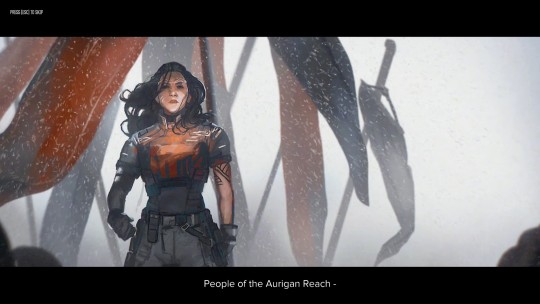
Played exactly a year ago today, I had a blast playing Battletech. enough to almost make it into my top 5 of 2023.
This game was my first interaction with lore from this universe and it felt like a pretty good jumping on point. It certainly helped when I played MechWarrior 5 at the end of last year. Narratively, this game kinda rocks. You've got a well-introduced main character and their nemesis and a long hill to push your rock up until you fulfill your goals.
strategically, the game is great. the main campaign quests it throws at you are pretty rad and sometimes does require knowing exactly what to do and with which units (and making sure you've got those units with you on drop).
What I really love about Battletech, and subsequently MechWarrior as a whole, is the mech customization. Unit optimization? Whatever you wanna call it. I liked scavenging for parts to make a mech, then equipping it with my most deadly weapons only to lose those weapons in combat. great times.
Wasteland 3
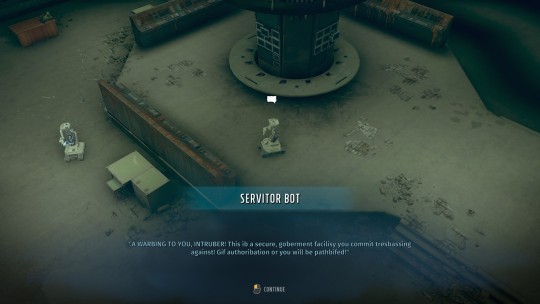
I didn't know what to think when I started played Wasteland 3. For me (I'm heavy into fantasy than sci-fi), it was pretty out of genre, setting-wise. it's post-apocalyptic modern and set in America (I really think it's important to point out that it's set in America). and it's not typically what I'm out to read.
what I did read was an incredibly written experience and really awesome narrative decision making along with solid mechanics. it was kinda cool to see my actions have consequences (which I looked up constantly because I knew what kind of game I was playing), like helping out a guy in Act 1 only for them to come back in halfway through Act 2.
and the skill tree was most impressive. for most of the game, it gives your team members well-defined roles, which I appreciated. and having narrative options tied to those, while I think is standard, was pretty nice considering I had to talk to NPCs with multiple characters to get what I wanted.
The Dungeon of Naheulbeuk: The Amulet of Chaos
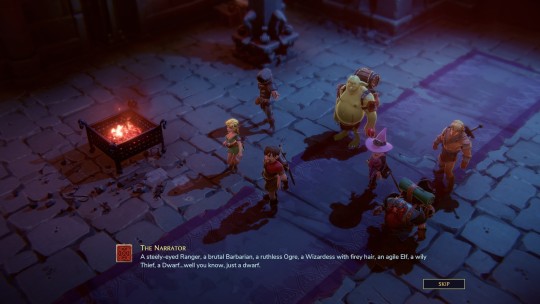
If you're more into Dungeons and Dragons rather than guns and mechs (like I am), here be the Dungeon of Naheulbeuk.
This one is more a classic one-to-one to Dungeons and Dragons and functions as a big dungeon crawl with an inn in it. meaning the combat mechanics were fleshed out and familiar for me! so it was pretty simple but the rooms do a bit to keep players on their toes with environmental hazards.
the story is straightfoward: get to the Dungeon Master so they can leave. oh but wait! the stairs aren't working! guess we'll take the long way around~! overall, the dialogue was pretty hit-or-miss (more misses with the comedy for me though).
Fae Tactics

Fae Tactics was a pretty big surprise in a lot of ways.
as another one of my honourable mentions for games I played last year, Fae Tactics has solid gameplay and story.
I actually really liked how the story plays itself out. you get bits of non-linear progression with every main quest you complete, meaning you can do most of the game in any order you want. I did do everything in my first playthrough, so it was cool to see different parts of the story connect, and the epilogues that I got in the end. and how the story evolves from one goal to another and how it resolves conflicts is pretty interesting!
moreover, I thought the dialogue for this game was pretty aight. it matched the mood of the game as well as the characters. it knew when to be serious and when to try to be funny.
mechanically, this game is less about customizing your team and more about completing combat with what you have, until you reach maximum upgrades (where you've got pretty obvious choices). capturing your own fae during battle is actually really important since it gives you more options moving forward.
Symphony of War: The Nephilim Saga
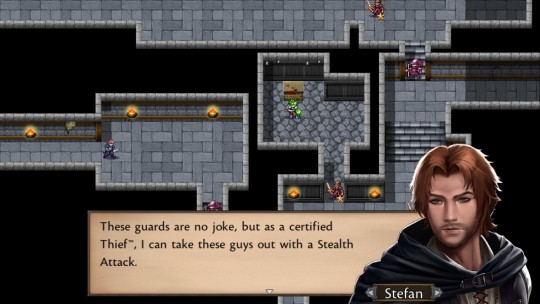
This was one I've wanted to play but only recently got the chance! One of this year's first games for me, Symphony of War: The Nephilim Saga felt pretty good to play.
outright, the narrative I think needs some work. it's not the best, but it gets the job done. it's easy enough to follow and enough characters to like to get you through the game. surprisingly, or maybe unsurprisingly, I didn't like the main character's arc, though it does make a little sense in hindsight.
the best part about this game was the gameplay, for sure. creating an army and commanding it was so fun. there's so much you can do because of the freedom the game allows you in your units. there are items to change affinities, upgrade stats, give your squads more capacity (that's a big one), and so on. additionally, having a maximum 9 units (on average it's more like 6-8 units) per squad was creatively engaging.
one of the biggest things is the fact you can class promote/demote at will. the resources are only allocated and never go away, and you really notice it when you get the tech upgrades that reduces resource costs. and I think the game made the right choice in setting the strongest unit type (dragons) aside for in-combat stores only.
in battle, the strategy was pretty straightforward. the game often relies on sending reinforcements for increased difficulty. but otherwise, the maps provided pretty interesting problems for players to solve. and by the end game, you're commanding up to 20 squads per turn, which is kind of insane.

to recap!
Battletech is a great starting point into MechWarrior lore while being an awesome tactical game.
with a wildly different setting from the rest, Wasteland 3 provides the most dynamic narrative of the bunch with solid strategic gameplay to pair along with it!
for D&D lovers, The Dungeon of Naheulbeuk: The Amulet of Chaos is pretty aight, especially if you don't have the funds for newer titles.
Fae Tactics was a surprise hit that strategy/tactical RPG fans will love!
and lastly, Symphony of War: The Nephilim Saga is robust in tactics and will get you thinking about the best army composition.
Here's to more tactical games in the future! in fact I already have more lined up-
As always,
Enjoy gaming!
#game review#video games#video game#gaming#game list#ink reviews#Battletech#Wasteland 3#The Dungeon of Naheulbeuk#Fae Tactics#Symphony of War: The Nephilim Saga#damn I should really keep notes on games I play-#memory is so bad sometimes for games I played a year+ ago
1 note
·
View note
Text
Snowflake Challenge #6
In your own space, share a favourite piece of original canon (a show, a specific TV episode, a storyline, a book or series, a scene from a movie, etc) and explain why you love it so much. Post your answer to today’s challenge in your own space and leave a comment in this post saying you did it. Include a link to your post if you feel comfortable doing so.
I'm a big fan of the Yakuza/Like a Dragon video game series (called Ryu ga Gotoku in Japanese). They also have a spin off series called Judgment, about a different protagonist but set in the same world. They are set in a series of fictional versions of locations in Japan (such as a city called Sotenbori, which is modeled after the real life Dotonbori, Osaka), and follow a series of protagonists through violent stories about the yakuza and organised crime. They're gritty and violent games that take themselves very seriously... but also have some of the weirdest, silliest sidequests and minigames I have ever seen.
I joined the fandom in 2019 after playing Yakuza 0, and have been in love with these games ever since. But my favorite game in the series is Yakuza: Like a Dragon (RGG 7), so that's what I want to talk about for today's challenge.
Yakuza: Like a Dragon stars a new protagonist, Ichiban Kasuga, who starts the game by taking the fall for a murder at his boss' request and spends 18 years in prison. Ichiban is an incredibly endearing character, loyal to a fault and a massive dork who loves Dragon Quest and helping everyone he meets. After being shot, Ichiban wakes up in Ijincho, Yokohama, where he begins his quest to work out what happened to him and cope with how much the world has changed in 18 years.
Other than adoring Ichiban, I love this game because they were brave enough to drastically change the combat system, switching to a turn-based RPG complete with classes (called jobs in the game), a result of Ichiban's overactive imagination and love of JPRGs. And it was a big gamble, but in my personal opinion, it worked. I love the old games and their beat-em-up combat, but I also love turn-based RPGs, and LAD implements all the changes so well. The combat is fun and creative, especially when experimenting with all the different classes.I never get tired of dungeon crawling to level up and find upgrade materials in this game.
Due to being an RPG, the game of course gives Ichiban a collection of party members who all provide their own skills in battle. You meet your party members throughout the game, and they're all such entertaining and interesting characters who I love spending time with. You can take part in Drink Links at the bar, where you have conversations with your allies that teach you more about them, and also unlock new classes for them to use in combat.
Honestly, I could ramble about this game forever, but I'd end up going into spoiler territory. So I'll stop here. Thanks for reading my infodump about this video game!
#snowflake challenge#snowflake challenge 2024#yakuza like a dragon#yakuza#ryu ga gotoku#like a dragon#kasuga ichiban
1 note
·
View note